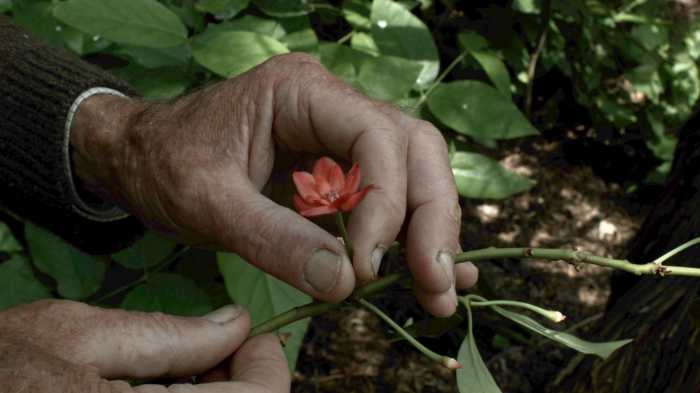The Phoenix Hellraisers in a huddle during the Gay Bowl tournament. | STEVE DONG LEE/ ABRAMORAMA
The athletes of the New York Warriors, the city’s gay flag football team — a three-time championship winning squad (2006-2008) — are hungry. They lost the National Gay Flag Football League (NGFFL) title in 2009 and are determined to regain their title.
Coached by former NFL player Wade Davis, the Warriors’ journey, from practice to competition, is featured in the brisk, entertaining documentary, “F(l)ag Football.” The film, made in 2015, but just getting a theatrical release now, chronicles the Warriors, along with two other NGFFL teams — the LA Motion and the Phoenix Hellraisers — as they prepare for and play in the 2010 Gay Bowl.
Director Seth Greenleaf introduces several players who talk about breaking stereotypes as gay athletes. Football, for some of the NGFFL players, is a release for the pent-up emotions they have had about their sexual identity. These athletes discuss the macho image that football propagates and how gays playing the sport prompt straight guys to question their masculinity.
Seth Greenleaf examines the passions, grit, camaraderie of gay flag football
Still, “F(l)ag Football” makes clear that for NGFFL players it is very much football first and sexuality second. The out athletes, the film insists, are LGBTQ activists simply by playing a game.
That’s a sound message to impart, and the film does so well. Phoenix Hellraiser Jared Garduno, who was then the league’s commissioner, emphasizes that the NGFFL was established for queer football players to make friends and be social. The camaraderie on display in the film suggests that strategy is working. As viewers watch the Warriors on the field, the teammates’ affection for one other is infectious.
Wade Davis (his back facing), a former NFL player and a player-coach with the New York Warriors, hugs Cyd Zeigler, an LA Motion player prior to a game. | STEVE DONG LEE/ ABRAMORAMA
Bonding over sports is what drives Cyd Zeigler, founder of Outsports and a player and mentor for the NGFFL’s LA Motion. A former Warrior, Zeigler moved out to LA and joined the Motion. He talks about how sports proved the avenue for him and his family to connect. Zeigler draws on the emotions he gains from sports to motivate his teammates. The drama for his team revolves not just around the Motion defending their 2009 title, but also about making a decision about who to use as a lead quarterback in the Gay Bowl.
On the topic of quarterbacks, Joey Jacinto, the Hellraisers’ QB, is arguably the best in the league. He goes all out for his team on and off the field, playing hard and partying harder. The Hellraisers are shown to be a fun squad, and watching Jacinto and Garduno dress up and perform in drag to raise money for the NGFFL is amusing but also inspiring.
“F(l)ag Football” showcases these players amidst their teammates well, but it also provides some personal details. A revealing segment of the documentary has the athletes talking about their experiences coming out. While Wade Davis got a difficult response from his mother, LA captain Brenton Metzler describes how he was outed by his sister. In contrast, the Warriors’ “Tall Paul” (as he is known) discloses that he has not yet told his father he is gay.
Happily, Greenleaf gives screen time to some of the league’s most dynamic personalities. The Motion’s Jeremiah Phipps is a mouthy player, very engaging in his interviews and even more out there during the Gay Bowl. Molly Lenore, a trans woman on the Warriors, is perhaps the game’s most physical player. She loves to hit, and her teammates proudly display the bruises she caused during practice. There is genuine warmth in the way the film shows these players proving themselves on and off the gridiron.
The NGFFL, the film reveals, is also open to straight players, but rules dictate that only 20 percent of a team can be non-LGBTQ. When the Motion petitions to increase that to 25 percent, it prompts a debate about the purpose of a gay sports league and the meaning of inclusivity. The topic is important, but the Motion’s effort is aimed at garnering an advantage, which comes off as disingenuous. When one of the straight players is cut, he complains.
One of the film’s best sequences has the Warriors playing a practice game against a straight Long Island flag football team without disclosing the sexuality of their players. (Molly Lenore doesn’t play that night). When one of the Long Island players discovers Wade was in the NFL, he is surprised — and after learning the team is comprised mostly of gay members, he is respectful.
With the first hour of the film introducing the players and some of the issues the league contends with, its final third focuses on the Gay Bowl. There is plenty of action on the field, and in at least two nail-biting endings we feel the palpable heartbreak on teams that suffer the agony of defeat. Greenleaf builds real tension during these games, and there are some terrific scenes shot from inside each team’s huddle.
“F(l)ag Football” doesn’t contain any locker room scenes (or banter), though there is some on-the-field butt slapping, which is in keeping with the film’s message about sportsmanship, not sexuality. The documentary may be preaching to the choir, but non-football loving queer folks as well as straight football fans can enjoy the film because of its resonant messages about pride, acceptance, support, and community.
F(L)AG FOOTBALL | Directed by Seth Greenleaf | Abramorama | Opens Jun. 16 | Cinepolis Chelsea, 260 W. 23rd St. | cinepolisusa.com/chelsea




































